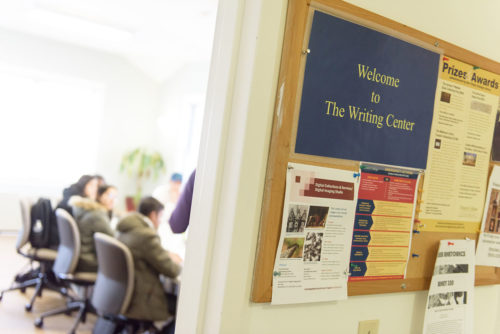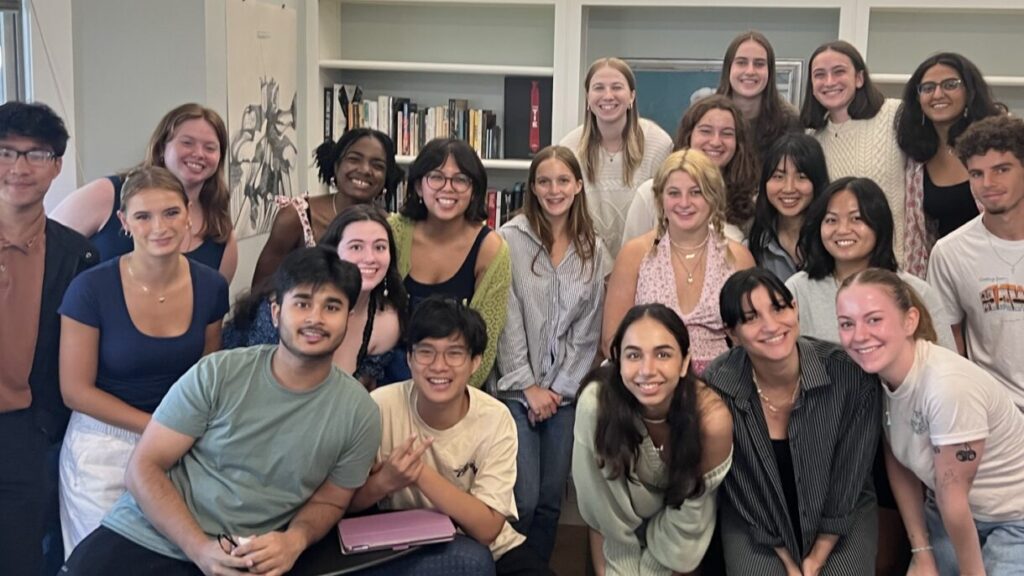Student Reflects on Benefits and Impact of Trinity’s Writing Center
Maddie Hengerer ’26, an English major and legal studies minor from Baltimore, Maryland, is currently a student writing intern for Trinity’s Office of Communications and Marketing. She is a member of The Stella Society, a local philanthropic sorority at Trinity, and a writer for The Summiter, Trinity’s newest literary magazine. Here, she reflects on her experience attending a panel discussion about the future of the College’s Allan K. Smith Center for Writing and Rhetoric held during Trinity’s Bicentennial Spring Symposium, and how it connects to her personal and academic interests:
When I first came to Trinity, I was still unsure of what exactly I wanted to study, but I always knew that I loved to write. It gives me the ability to be creative and actively express my ideas.
Since Trinity is a liberal arts college, I have been able to take courses in several different fields of study that emphasize the importance of writing. As a first-year, I was selected to participate in the Humanities Gateway Program, a series of four seminar courses covering various subjects within the humanities, such as classical studies, religious studies, history, and literature. This program was a great experience for me, as it strengthened my writing skills and ultimately helped me decide what I wanted to study. I realized how much I enjoyed the content and style of English courses at Trinity and I declared as an English major by the spring semester.
 Early in my academic career at Trinity, I learned about the Writing Center, which works with students at all stages of the writing process to develop their confidence and abilities as writers. The student tutors, called writing associates, work with fellow students to provide feedback on specific pieces and improve their overall writing skills. The Writing Center reports that last year, it hosted 1,962 appointments with 637 students—which is just under 30 percent of all Trinity students.
Early in my academic career at Trinity, I learned about the Writing Center, which works with students at all stages of the writing process to develop their confidence and abilities as writers. The student tutors, called writing associates, work with fellow students to provide feedback on specific pieces and improve their overall writing skills. The Writing Center reports that last year, it hosted 1,962 appointments with 637 students—which is just under 30 percent of all Trinity students.
In my own visits to the Writing Center, the tutors have always given me useful feedback and applicable techniques to help me refine my writing. Last semester, I visited the Writing Center for help with an assignment in a public policy course. The feedback I received allowed me to look at the assignment from another perspective. Although I was used to receiving help with English papers, the Writing Center was still equally as helpful with another subject.
During the College’s Bicentennial Spring Symposium, which was centered around the themes of reflection and action, the Writing Center held a panel titled “The Future of the Writing Center at Trinity College.” The panel was led by four student writing associates—Erin Barbakoff ’26, Pari Chouhan ’26, Molly Simons ’24, and Beatrice Yue ’26—along with a student moderator, Ella Campopiano ’24, who each shared their own experiences and perspectives working as tutors. During the discussion, the panelists shared recent changes in the Writing Center, research projects that the tutors had been working on, and initiatives they are taking to make the center more inclusive in the future. In attending this panel, I wanted to learn more about its future and what initiatives it is taking to achieve its goals.

“We create better writers, not just better writing,” said Simons. “Our primary goal is to help the writer become a better writer.”
The Writing Center’s assistance is interdisciplinary and goes beyond focusing solely on English or writing courses. In fact, the panelists shared that English isn’t even one of the top three subjects for which they get asked for help, which surprised me. The writing associates assist with an array of subjects, from political science, to art, and even chemistry. “Everything you learn as both a tutee and a tutor is very applicable and versatile,” said Chouhan.
As the writing associates shared their own stories of working as tutors, I noticed that they all described the Writing Center as a tight-knit community, brought together through different experiences. The associates bond with one another, in addition to creating new connections across campus.
While reviewing the Writing Center’s future goals, the panelists shared that the center aims to prioritize inclusivity. “If you write, you belong here,” states the center’s motto, which all of its associates abide by in their work.

Not only does the Writing Center promote inclusivity within the Trinity community, but it also offers its resources to the greater Hartford community. By working with organizations such as Integrated Refugee & Immigrant Services (IRIS), the Boys & Girls Club, and the Hartford Correctional Center, the writing associates are able to extend their tutoring skills to others and give back to the community.
The skills that the Writing Center teaches are applicable to all areas of study, and always it’s important to be a good writer, no matter what you study or what your job is. With my interests in pursuing a career in either journalism or law, I will definitely use these skills throughout my future endeavors.
The Writing Center is located at 115 Vernon (the English Department building) in Room 109. To schedule an appointment, click here.
